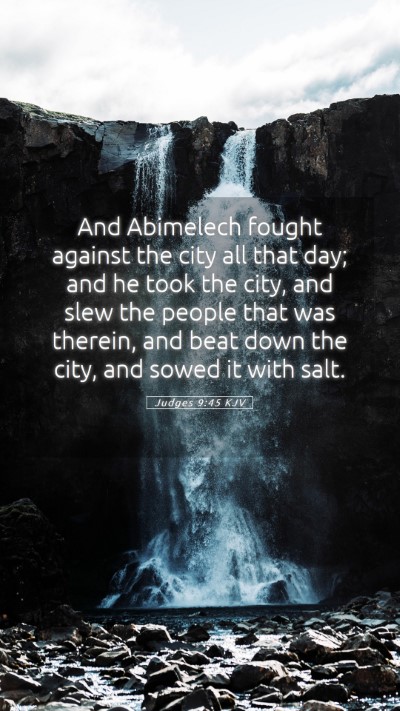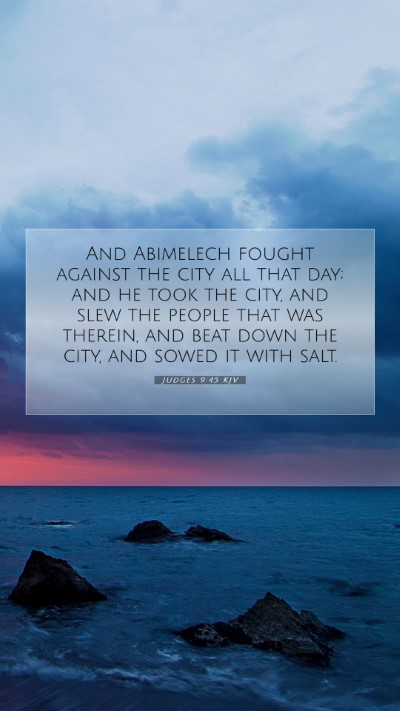Bible Verse Meaning and Commentary on Judges 9:45
This passage from Judges 9:45 states:
"And Abimelech fought against the city all that day; and he took the city, and killed the people that were therein, and beat down the city, and sowed it with salt."
Overview and Context
The Book of Judges describes a tumultuous period in Israel's history characterized by cycles of sin, oppression, repentance, and deliverance. Judges 9 narrates the violent rise of Abimelech to power after the death of his father, Gideon. This verse takes place during Abimelech's siege of Shechem, illustrating the brutality of his reign and his determination to establish his authority.
Insights from Public Domain Commentaries
Matthew Henry's Commentary
Matthew Henry notes that Abimelech’s actions exemplify the consequences of ambition and treachery. His approach to seize control through fear and violence marks a significant moral downfall from the peaceful leadership Gideon provided. Henry comments on the metaphorical use of "sow[ing] it with salt" as an expression of complete desolation—sowing salt on land rendered it infertile, symbolizing Abimelech's intent to obliterate any hope of resurgence in Shechem.
Albert Barnes' Commentary
Barnes elaborates on the historical context surrounding the passage. The act of salting the ground was a prevalent practice in ancient warfare, carried out to signify total victory and ensure that the conquered could not return to reclaim their land. This illustrates the finality of Abimelech's conquest and the ruthless nature of his leadership—a stark contrast to Gideon's previous merciful governance. He emphasizes that this act reflects God’s judgment against those who had followed Abimelech, serving both as punishment and as a warning against disloyalty.
Adam Clarke's Commentary
Adam Clarke focuses on the moral implications of such a ruthless conquest. He points out that Abimelech, though he achieved his goal through violence and treachery, ultimately set a precedent for further bloodshed and division among the tribes of Israel. Clarke highlights this event as a critical reflection on leadership, demonstrating that corrupt means can lead to desolate ends, warning future leaders about the consequences of following in his footsteps.
Thematic Analysis
Combined insights from these commentaries reveal several key themes in Judges 9:45:
- The Consequences of Ambition: Abimelech’s rise to power through violence serves as a potent reminder of the dark side of unchecked ambition.
- Symbolism of Salt: The salting of the ground communicates a sense of finality and utter destruction—representing both literal and spiritual barrenness.
- Moral Degradation: The shift from Gideon's benevolent leadership to Abimelech's tyrannical rule highlights a broader moral decay in Israel before the establishment of the monarchy.
Applications for Today
Readers can find several applications in this passage, relevant for both personal reflection and group study:
- Leadership Lessons: What type of leader do we aspire to be? Are our actions motivated by noble intentions or selfish ambitions?
- Impact of Choices: How do our choices affect our communities and relationships? Like salt, our actions can bring preservation or destruction.
- Moral Reflection: In what ways do we see traits of Abimelech in modern leadership? How can we counteract that influence?
Related Verses
This verse offers rich opportunities for cross-reference and deeper exploration. Here are several related passages for further study:
- Deuteronomy 29:23: Discusses the significance of salt in covenant contexts.
- Judges 8:33-35: Highlights Israel's disloyalty and the consequences of forsaking their covenant with God.
- Mark 9:50: Jesus speaks of salt’s preserving quality, contrasting it with Abimelech's destructive actions.
Conclusion
Judges 9:45 encapsulates a critical moment in Israel's history that serves as a cautionary tale against tyranny and moral corruption. Its historical context, combined with thematic interpretations from various commentaries, invites readers to engage deeply with the text and to reflect on its applications in contemporary life.
Further Study and Resources
For those interested in deepening their understanding of this passage and the broader themes within the Book of Judges, consider exploring the following:
- Bible study guides focusing on the Book of Judges
- Online Bible study groups for discussion on themes of leadership and morality
- Scripture analysis courses that emphasize historical context and application


